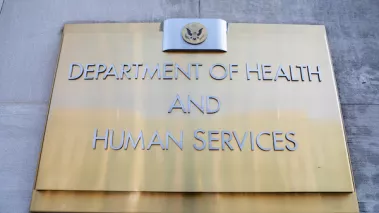Table of Contents
Is HHS about to regulate ‘misinformation’?

Mark Van Scyoc / Shutterstock.com
The Department of Health and Human Services is gathering research on public health "misinformation."
On Monday, FIRE submitted a public comment to the federal Department of Health and Human Services in response to a Request for Information (RFI) regarding health misinformation. While we recognize the Department may wish to track and counter what it considers misinformation related to COVID-19, we are concerned the possible rulemaking following the RFI could lead HHS to infringe on free speech rights and threaten academic freedom at institutions of higher education.
We urge HHS to take into account First Amendment protections and consider the ramifications the regulation of speech, even speech the Department disagrees with, will have on scientific advancement.
The RFI specifically requested information related to “the impact and prevalence of health misinformation in the digital information environment during the COVID-19 pandemic” in order to understand the “impact . . . on healthcare infrastructure and public health more broadly during the pandemic,” including “the unique role the information environment played in the societal response” and the “implications for future public health emergencies.”
We noted two concerns in our comment.
First, defining misinformation invites violations of the First Amendment. While it has been reported that misinformation has been promulgated from a multitude of sources since the onset of the pandemic, it is important to remember that there are no general exceptions to the First Amendment for false statements. For example, in United States v. Alvarez, the Supreme Court of the United States ruled that the Stolen Valor Act, a law that criminalized falsely claiming one had received certain military decorations or medals, violated the First Amendment, writing:
[S]uppression of speech by the government can make exposure of falsity more difficult, not less so. Society has the right and civic duty to engage in open, dynamic, rational discourse. These ends are not well served when the government seeks to orchestrate public discussion through content-based mandates. . . . Only a weak society needs government protection or intervention before it pursues its resolve to preserve the truth. Truth needs neither handcuffs nor a badge for its vindication.
By regulating “misinformation,” HHS may inadvertently close the door on important scientific and medical advancements that are initially considered outside the mainstream.
False speech enjoys constitutional protection outside very specific exceptions such as defamation, which requires much more than just a false statement. HHS must not adopt misinformation regulations that restrict or punish protected speech.
Second, defining misinformation on college and university campuses threatens academic freedom and stifles criticism of prevailing understandings of medicine. Institutions of higher education are primary locations of medical research and scientific study. Regulations that impact what can be said in those fields will no doubt reach speech on college campuses. As we write in the comment:
As with any scientific research, including research related to COVID-19, trial and error is the driving force of scientific advancement. When hypotheses are tested, retested, peer reviewed, and further scrutinized, information learned through this process can change. This means prior knowledge once taken as false may subsequently be found to be true and vice versa.
By regulating “misinformation,” HHS may inadvertently close the door on important scientific and medical advancements that are initially considered outside the mainstream. The sands of our understanding constantly shift, as prevailing assumptions in medicine may later be proven wrong. Medical professionals must be able to question the status quo, and we must not foreclose long-term progress by officially labeling criticisms “misinformation” in fear of purportedly erroneous or misleading information.
RFIs are often used to determine whether an agency will proceed in rulemaking and, if so, what approach to take. As always, FIRE is ready to defend freedom of speech and academic freedom against government interference. And, as stated in our public comment, we urge the Department to “heed the limitations that the First Amendment places on government and consider the negative effects that regulation of speech will have on future scientific advancement.”
Recent Articles
Get the latest free speech news and analysis from FIRE.

VICTORY: Court vindicates professor investigated for parodying university’s ‘land acknowledgment’ on syllabus

Can the government ban controversial public holiday displays?

DOJ plan to target ‘domestic terrorists’ risks chilling speech


